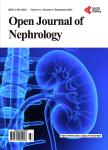Outcome of Renal Transplantation at Ahmed Gasim Cardiac and Renal Transplant Centre in Sudan-2014
Outcome of Renal Transplantation at Ahmed Gasim Cardiac and Renal Transplant Centre in Sudan-2014作者机构:Department of Surgery Sudan Medical Specialist Board Khartoum Sudan Department of Surgery Alnaw Teaching Hospital khartoum Sudan Sudan Medical Specialist Board Khartoum Sudan
出 版 物:《Open Journal of Nephrology》 (肾脏病(英文))
年 卷 期:2023年第13卷第1期
页 面:39-56页
学科分类:1002[医学-临床医学] 100214[医学-肿瘤学] 10[医学]
主 题:Kidney Transplant Patient Survival Graft Survival Graft Rejection
摘 要:Background: Although not life-saving procedures like liver or heart transplantation, renal transplantation is the preferred treatment for many patients with end-stage renal disease because it improves patients’ quality of life, while other forms of renal replacement therapy (RRT) such as haemodialysis (HDX) shown to regain only 10% of the patient’s renal function [1]. Transplantation releases patients from the dietary and fluid restrictions and the physical constraints imposed by other forms of (RRT), patients become able to return to their normal activities. Patient’s 5-year survival is higher post transplant. Patients and methods: This is Descriptive, retro-prospective, cross sectional analytic and multicentre study done in Ahmed Gasim Cardiac and Renal Transplant Centre including 105 patients. After meeting the Inclusion Criteria and exclusion Criteria, then cases were selected and written in constructed questionnaire. The aim of the study was to evaluate the outcome of renal transplantation in Sudan. Results: 105 cases were used with male predominate and ratio male to female ratio 3:1, the main age of presentation between 31 - 45 years, most of the patients discharge uneventful with good outcome. During one-year follow-up following renal transplantation. Patient survival 95.2 % graft survival 82.4%. Overall morbidity shows 70.5%. Conclusion: this study showed that the one-year patient survival of 95.2%. Actuarial one-year graft survival of 92.4%. Renal transplantation complications can be reduced by meticulous preoperative workup including good cardiovascular assessment, tissue mismatch and BMI good postoperative follow up for early detection of graft rejection and long-term complications and finally patient education.



